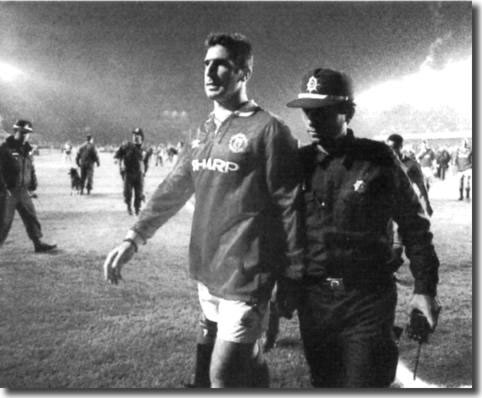 Part 1 L'enfant terrible - Part
2 Ooh, aah, Cantona!
Part 1 L'enfant terrible - Part
2 Ooh, aah, Cantona!
Eric Cantona was unquestionably delighted with his move to Old Trafford
at the end of 1992 and excited at the prospect of playing for one of
the biggest clubs in the world. United were down in sixth place in the
Premiership, nine points behind surprise leaders Norwich City and struggling
to get goals. They had a rock solid defence with Steve Bruce and Gary
Pallister protecting Peter Schmeichel, but they had only scored 18 goals
in 17 matches.
Cantona made his debut for United in the Manchester derby with City on
December 6 and his first goal in the new colours came in a 1-1 draw at
Chelsea on 19 December. A week later United launched an amazing comeback
away to Sheffield Wednesday, coming back to 3-3 after being 3-0 down with
just twenty minutes to go. Cantona got the decisive final goal and the
fightback convinced United they had the resolve and spirit to beat anyone.
It was a key point in the Old Trafford club's rise to dominance of English
football.
In these games the Frenchman was obviously trying to find his feet and
learning exactly how best to play with a very different set of players
from what he was used to at Elland Road. He was now just one of many star
names and his unique style had to be moulded into the team's pattern.
The next couple of weeks saw a 5-0 win over Coventry and a 4-1 thrashing
of Tottenham and the improvement in form was enough to take United to
the top of the table. A visit to Cantona's former family at Leeds was
an eye opener for the man who was now reviled by his former disciples.
The supporters welcomed United with their customary venom and hostility
and were satiated when he was booked in the 30th minute, but United had
the last laugh, coming away with a point from a goalless draw. Cantona's
ten months at Elland Road were now fully behind him and he turned his
attention to the future.
United were locked in the last few weeks of the 1992/93 season with Aston
Villa and Norwich in a three way battle for the title. United played Norwich
on 5 April with just six matches left. Aston Villa headed the table with
United and Norwich a point behind. United's 3-1 victory that day was topped
off with a third goal from Cantona and the result was vital, effectively
putting Norwich out of contention.
United followed up with convincing wins over Chelsea and Crystal Palace
and as things moved to a climax with United now topping the table, Cantona
joined up with his French colleagues for a vital World Cup qualifier with
Sweden on 28 April. Cantona hit both goals in a wonderful 2-1 win.
Four days later Cantona could celebrate a title win for a third successive
year, and all with different clubs. Villa had lost 1-0 at Oldham and could
no longer overtake United - after 26 years the championship had finally
returned to Old Trafford. It was a special moment in the history of Manchester
United and Cantona had been the inspiration for the triumph. He hit 9
special goals in his 22 Premiership games and was now as loved at Old
Trafford as he had been previously at Elland Road. 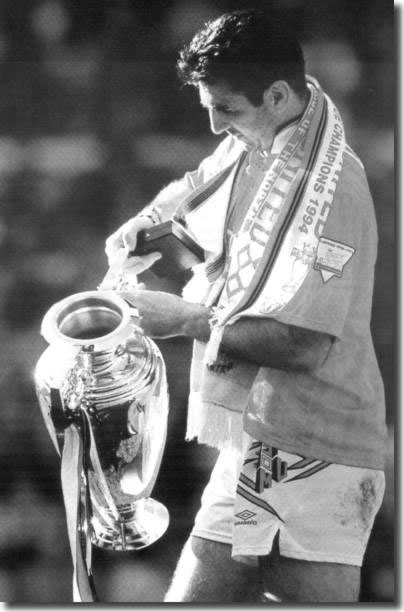 The
cry of 'Ooh, aah, Cantona,' had been exported across the Pennines and
Eric had truly found his spiritual home.
The
cry of 'Ooh, aah, Cantona,' had been exported across the Pennines and
Eric had truly found his spiritual home.
1993-94 was to be even better and in all competitions Cantona scored
25 goals in 48 matches. United kicked off the season in all conquering
form, although their assault on the European Cup was a disappointment.
Turkey's Galatasaray drew 3-3 at Old Trafford and the second leg was a
0-0 draw to send the Turks through on the away goals rule. And to complete
United's night of misery, Cantona was sent off in the mayhem that followed
the final whistle following comments made to the referee. He was banned
for four European matches in a throwback to his disciplinary problems
in previous years in France. He was certainly less hot headed since he
had crossed the Channel, but controversy had returned to dog his footsteps.
back to top
By the end of January 1994, United had their sights set on the English
treble - they were in a two horse race with Blackburn for the Premiership,
they had progressed to the League Cup semi finals and they were making
their customary assault on the FA Cup. Cantona sustained an injury in
a 2-2 draw at West Ham in the league and missed United's marvellous second
leg win against Sheffield Wednesday in the League Cup. United booked their
tickets for Wembley with a 4-1 victory. The other game he missed, however,
was less successful. Chelsea came to Old Trafford and became the first
away side to win there in 17 months. Were they taking on too much?
It certainly looked like it, as United's season seemed about to fall
about in an explosion of indiscipline and bad temper. Cantona got red
carded again in two successive matches, against Swindon and Arsenal. The
second dismissal against the Gunners was evidence that Cantona's history
was starting to cause problems as it did not appear justified. He received
a five match ban. Around the same time goalkeeper Peter Schmeichel and
winger Andrei Kanchelskis also received red cards.
United had reached the FA Cup semi finals, but were starting to look
shaky in the league and seemed to have shot their bolt when Aston Villa
thoroughly outplayed them at Wembley to win 2-1 and secure the League
Cup, putting paid to United's dreams of an unprecedented treble.
Unconvincing home wins over Liverpool and Oldham and an away defeat at
rivals Blackburn provided ammunition for the sceptics and for a long period
it looked like Oldham were going to win the FA Cup semi final against
United, until a typical Mark Hughes volley 45 seconds from the end of
extra time kept double hopes alive. United went on to win the replay and
secure a Wembley date for the final with Chelsea.
Cantona returned from suspension for the away match at Leeds and helped
United gain a 2-0 win which helped settle the frayed nerves that were
showing. United ended the season with a run of victories which enabled
them to retain the Premiership. That left the Cup final with Chelsea as
the only hurdle remaining in United's pursuit of a League and Cup double.
After close opening exchanges, two penalties, both converted by Cantona,
sparked off an easy 4-0 win and Cantona had once again proven himself
as a lucky talisman - he had now won four league titles in a row and could
also boast a key role in the achievement of a rare occurrence in English
football, the double. His personal contribution was recognised by the
PFA, when the Frenchman was elected as Player of the Year by his fellow
professionals - a sweet moment, indeed, after all the controversy over
the years.
His season was made complete when the new French national team manager
Aime Jacquet asked him to captain the side. France had failed to qualify
for the World Cup finals in the USA and United had crashed in the European
Cup, but in the summer of 1994, Eric Cantona was feeling on top of the
world.
The Frenchman 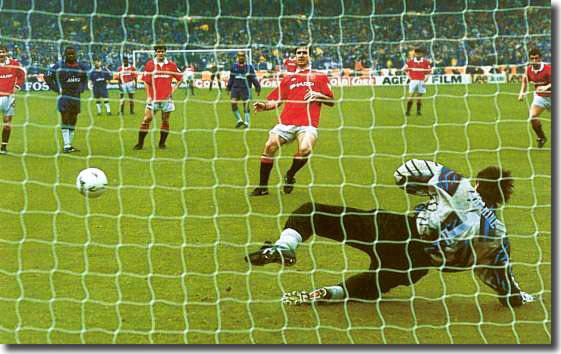 scored one of the goals as United beat Blackburn 2-0 in
the Charity Shield at the start of the 1994-95 season, but that was the
best memory of a dismal and controversial season. United were to be Double
runners up, losing out on the last day to Blackburn in the Premiership
and to Everton in the Cup final, but Cantona was to miss the second half
of the season.
scored one of the goals as United beat Blackburn 2-0 in
the Charity Shield at the start of the 1994-95 season, but that was the
best memory of a dismal and controversial season. United were to be Double
runners up, losing out on the last day to Blackburn in the Premiership
and to Everton in the Cup final, but Cantona was to miss the second half
of the season.
Andy Cole arrived from Newcastle in January 1995 with the intention of
forming a new partnership with Cantona as United chased Blackburn in the
league after another dismal European Cup exit. Cole's debut was against
Blackburn but it was the Frenchman who got the only goal of the game,
heading home ten minutes from time.
Three days later the two were in the team again as they faced Crystal
Palace at Selhurst Park. Palace set out to provoke Cantona, having seen
the way he tended to lose his cool in the heat of action over the previous
18 months. There had been a series of niggling fouls which had gone unpunished
by referee Alan Wilkie and the chief culprit was defender Richard Shaw.
First, a tackle caught Cantona on his ankle, then a second challenge by
Shaw seemed to be directed at his Achilles tendon as he twisted, back
to goal, to try to lay off a pass to the running Cole. There were other
less blatant efforts to push him over the brink and the longer the game
went on, the more he seemed to be seething inside, ready for revenge when
the opportunity came. An injustice had to be punished. So it was that
early in the second half his spring finally snapped. In his eyes, Shaw
had escaped justice too many times, so Cantona took the law into his own
hands and retaliated. Wilkie saw it and had no hesitation in dismissing
him.
As he left the pitch he ran the gauntlet of the baying home supporters
goading him from the grandstand. One of them, Matthew Simmons, went a
step further. He made his way down the gangway from his seat somewhere
below the press box, hurling abuse and waving a clenched fist in Cantona's
direction. Suddenly, the Frenchman stopped, turned and made eye to eye
contact with Simmons. He seemed to ask, 'What did you say?'
back to top
He stepped over the frost repelling tarpaulin sheet which had been rolled
up alongside the pitch, and leapt through the air, ramming his foot into
the supporter's chest forcing him backwards. Simmons got to his feet flinging
punches, but a right cross from Cantona floored him again before both
men were wrestled apart.
The next day, the tabloids went to town, demanding Cantona's head and
hysterically asking for him to be kicked out of the game. United acted
swiftly, banning him to the end of the season and fining him two weeks'
wages. The FA extended the ban until 30 September and Cantona then faced
a Magistrate's court hearing on a charge of assault. He got a two week
jail sentence, but on appeal this was reduced to community service, on
the basis of the provocation from Simmons. He was also stripped of the
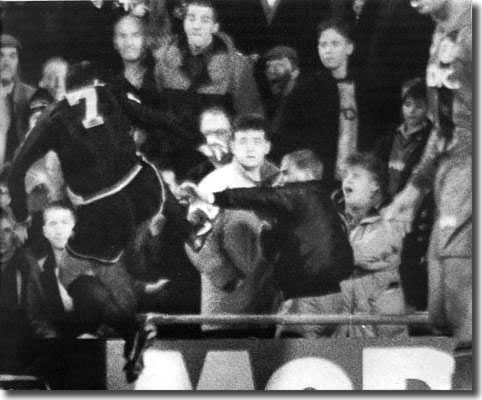 French
captaincy and never played for the side again.
French
captaincy and never played for the side again.
There were rumours that Cantona would quit England as he had France,
but while he was out of action he spent his community service coaching
youngsters in Manchester and found himself loving it so much that he continued
even after the formal sentence was completed. United were relieved to
announce on April 28 that Cantona would be staying and, in fact, had signed
a three year contract. He had decided to fight his way back and prove
his many critics wrong.
It was 1 October 1995 and Eric Cantona was about to return to the United
side. The Frenchman made his comeback in a match against Liverpool, which
was moved back a day so that he could play in a match that Sky Television
were covering live.
The season was five weeks old and United had got off to an indifferent
start. They had occupied top spot in the Premiership for one Saturday
night, dropping to second place the following day as Newcastle continued
in formidable form. In the League Cup they had suffered a major setback,
losing 3-0 at home to York City in the first leg of their opening tie,
but, perhaps more disappointingly, they were out of contention in Europe.
Rotor Volgograd ended hopes of a run in the UEFA Cup by scoring twice
at Old Trafford. Paul Ince, Mark Hughes and Andrei Kanchelskis had all
left Old Trafford during the summer and many felt that, with the youngsters
that Alex Ferguson had drafted in to replace them, United would struggle.
Almost up to the day of his return, there had been doubts about Cantona's
future. Despite assurances he would stay at Old Trafford, the predictions
that he might walk continued. But he duly walked out to a rapturous greeting
at Old Trafford. The moment they had all waited for had at last arrived.
There he was with that familiar straight backed walk which gave him that
seeming air of arrogance. It was the same as it had been the day he first
stepped out at Old Trafford for the second half of a derby game against
City. The flicks, the vision, the back heels, the skills were all still
there. He was an immediate success.
United could not have got off to a better start. In the first minute
they took the lead with Cantona creating a goal with virtually his first
touch. Nicky Butt forced the ball home from close range, but King Cantona
really was back and the crowd sensed that success was in the air again.
It would not come that particular afternoon though. Liverpool fought
hard. They were the form team and showed it when Robbie Fowler levelled
the scores after 33 minutes, then silenced the home fans by chipping Schmeichel
for a second goal. For 17 minutes the visitors led. Then Ryan Giggs 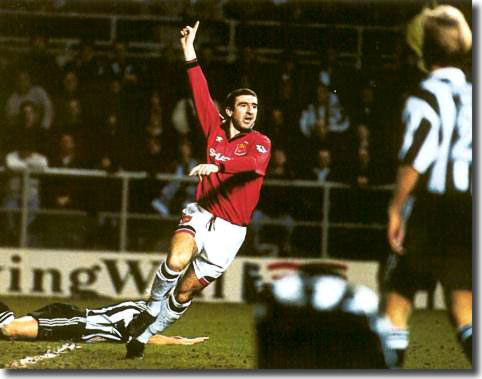 burst
through but was pulled back by Rob Jones. Referee David Elleray pointed
to the spot and Old Trafford erupted again. It was a penalty, and the
moment of truth had come.
burst
through but was pulled back by Rob Jones. Referee David Elleray pointed
to the spot and Old Trafford erupted again. It was a penalty, and the
moment of truth had come.
Cantona picked up the ball and stepped forward. He placed it on the spot,
turned away from goal then took two strides forwards and rammed his shot
to the left of David James as the keeper moved in the opposite direction.
The crowd went wild with delight - the King was back!
In the weeks that followed, opposing fans and players went out of their
way to provoke a reaction, but always Cantona went calmly about his business,
not getting involved, acting as the peacemaker if trouble flared. His
brief from Alex Ferguson following his return was that he should not make
challenges which could lead to retaliatory situations. Tackling was never
one of Cantona's strongest points.
In the Premiership, the gap between United and leaders Newcastle widened
as winter set in. Two points separated the sides after United beat Bryan
Robson's Middlesbrough at Old Trafford, but the difference grew to five
following defeat at Arsenal.
December was a disaster. It began with a 1-1 draw at Chelsea in which
Cantona was booked for a foul, his only caution of the entire season.
The squad was depleted by injuries and suspensions. It seemed there was
little hope of winning the title; Newcastle were in the driving seat,
swept along by a run of victories and their enthusiastic support. Cantona
scored twice in the home game with Sheffield Wednesday, his first goals
since the day of his return, but the game was the third successive draw
and was followed by defeats at Leeds and Liverpool.
However, as United entered January they went on a remarkable run inspired
by a burst of goals from Cantona. Their run started with the somewhat
fortunate 2-2 home draw against Sunderland in the third round of the FA
Cup, when the Frenchman's equaliser kept them in the competition. A draw
with Aston Villa was followed by ten consecutive wins. Cantona was in
explosive form, scoring the only goal at West Ham, two against Wimbledon
on his media hyped return to Selhurst Park, Cup goals against Reading
in the fourth round, and a penalty against Manchester City in the fifth
round, which levelled the scores before Lee Sharpe struck the winner.
United were through to the quarter-finals of the Cup, and in second place
in the Premiership, though still nine points adrift of Newcastle. The
Tynesiders were clear favourites, but there were signs that the pressure
was getting to them and their form started to slip.
back to top
United visited Newcastle on the run-in and were forced back by the Toon
Army for the first 45 minutes. Peter Schmeichel was in remarkable form,
making save after save as his defence stood solid around him. At one point
he was beaten by a goalbound shot, but it was headed off the line by none
other than Eric Cantona. It seemed to be just a matter of time before
Newcastle would take the lead. Could United stand the onslaught? One man
had the answer. Eric Cantona.
The second half was a transformation. United came more and more into
the game, having soaked up all the home side could offer. David Ginola
was booked for a foul born of frustration and it was time for Cantona
to take command. 51 minutes had gone, Andy Cole forced the ball out to
Phil Neville on the left flank and the young full back ran forward a few
yards, crossed, and Cantona met the ball on the right-hand edge of the
penalty area. He took it in his stride and hit a low half volley which
bounced beyond the reach of Srnicek in the Newcastle goal. Again the taunters
had been silenced.
The next Sunday, United beat Middlesbrough 3-0 with Cantona as captain
in Steve Bruce's absence through injury. They had regained the title.
And Cantona retained the captain's armband for the Cup final against Liverpool.
It was a tense and consequently dull game played out in a stifling midfield
stalemate. The game 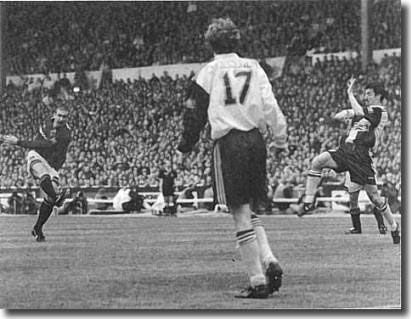 needed
a touch of flair and class and it got it. With extra time four minutes
away, United won a corner on the right. As the cross came over, David
James, the Liverpool keeper, misjudged his jump, collided with a team
mate and could only palm the ball out of the penalty area. It reached
Cantona who, leaning back to get into the correct position, hit a powerful
right footed volley through a ruck of players between him and the goal.
Wembley erupted and that was that. United had become the first side to
win the League and Cup double on more than one occasion.
needed
a touch of flair and class and it got it. With extra time four minutes
away, United won a corner on the right. As the cross came over, David
James, the Liverpool keeper, misjudged his jump, collided with a team
mate and could only palm the ball out of the penalty area. It reached
Cantona who, leaning back to get into the correct position, hit a powerful
right footed volley through a ruck of players between him and the goal.
Wembley erupted and that was that. United had become the first side to
win the League and Cup double on more than one occasion.
Steve Bruce left Old Trafford in the summer of 1996 and Cantona therefore
became the official club captain for the new term. It began well for him
as he scored the first of United's four goals as they trounced Newcastle
4-0 to win the Charity Shield. He also returned to Elland Road and hit
the final goal in a 4-0 hammering which signalled the departure of Howard
Wilkinson, the man who took the original risk in introducing Cantona to
English football. An irony if ever there was one.
However, something was missing. He still had the same arrogance, the
touches of brilliance, but his play lacked consistency. His match winning
performances grew rarer and rarer. He was still better than most players
in the Premiership, but he was growing dissatisfied. The European Cup
excited him, and United went their furthest since the 1968 win, but they
surprisingly stumbled in the semi finals against Borussia Dortmund. The
Premiership win in 1997 was something of a formality though it was not
settled until the beginning of May. An air of disillusionment and almost
complacency had settled on the Frenchman, and clearly there was something
wrong.
On Sunday 18 May, United chairman Martin Edwards held a press conference
and shocked the world by announcing Cantona's retirement. And that was
that - Cantona was gone, never to return.
He left behind him a glorious memory of how football could be played
in the Premiership in England - it doesn't have to be the crude kick and
rush and hoof of the playground, there is time and space if you can create
it, and glorious applause if you use it well. There were none better at
that than Eric Cantona. In the years from 1992 to 1997, he was simply
the best there was and will be long remembered for it.
Part 1 L'enfant terrible - Part
2 Ooh, aah, Cantona!
back to top











 Part 1 L'enfant terrible - Part
2 Ooh, aah, Cantona!
Part 1 L'enfant terrible - Part
2 Ooh, aah, Cantona! The
cry of 'Ooh, aah, Cantona,' had been exported across the Pennines and
Eric had truly found his spiritual home.
The
cry of 'Ooh, aah, Cantona,' had been exported across the Pennines and
Eric had truly found his spiritual home. scored one of the goals as United beat Blackburn 2-0 in
the Charity Shield at the start of the 1994-95 season, but that was the
best memory of a dismal and controversial season. United were to be Double
runners up, losing out on the last day to Blackburn in the Premiership
and to Everton in the Cup final, but Cantona was to miss the second half
of the season.
scored one of the goals as United beat Blackburn 2-0 in
the Charity Shield at the start of the 1994-95 season, but that was the
best memory of a dismal and controversial season. United were to be Double
runners up, losing out on the last day to Blackburn in the Premiership
and to Everton in the Cup final, but Cantona was to miss the second half
of the season. French
captaincy and never played for the side again.
French
captaincy and never played for the side again. burst
through but was pulled back by Rob Jones. Referee David Elleray pointed
to the spot and Old Trafford erupted again. It was a penalty, and the
moment of truth had come.
burst
through but was pulled back by Rob Jones. Referee David Elleray pointed
to the spot and Old Trafford erupted again. It was a penalty, and the
moment of truth had come. needed
a touch of flair and class and it got it. With extra time four minutes
away, United won a corner on the right. As the cross came over, David
James, the Liverpool keeper, misjudged his jump, collided with a team
mate and could only palm the ball out of the penalty area. It reached
Cantona who, leaning back to get into the correct position, hit a powerful
right footed volley through a ruck of players between him and the goal.
Wembley erupted and that was that. United had become the first side to
win the League and Cup double on more than one occasion.
needed
a touch of flair and class and it got it. With extra time four minutes
away, United won a corner on the right. As the cross came over, David
James, the Liverpool keeper, misjudged his jump, collided with a team
mate and could only palm the ball out of the penalty area. It reached
Cantona who, leaning back to get into the correct position, hit a powerful
right footed volley through a ruck of players between him and the goal.
Wembley erupted and that was that. United had become the first side to
win the League and Cup double on more than one occasion.